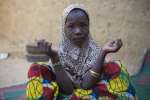- Text size
 |
|  |
|  |
| 
- Français
UNHCR struggles to help tens of thousands newly displaced by Boko Haram in Niger
Briefing Notes, 19 January 2016
This is a summary of what was said by UNHCR spokesperson Adrian Edwards – to whom quoted text may be attributed – at the press briefing, on 19 January 2016, at the Palais des Nations in Geneva.
UNHCR and its partners are struggling to help an estimated 100,000 people newly displaced in recent weeks in south-east Niger's Diffa region by attacks launched by Nigeria's Boko Haram insurgency group.
Our team in Niger describes the situation as very serious with acute shortages of shelter and non-food items for the displaced. These include local villagers, internally displaced people from Niger, people who have been displaced several times and Nigerian refugees who were staying with host families or in sites for the displaced in a 10 to 30-kilometre belt of land between the River Komadougou and Niger's Route National No.1. Some 170 villages have been left empty in the Diffa region.
UNHCR is redirecting available resources to meet the urgent shelter and other assistance and calls on donors for extra support to help this vulnerable population. The officials expect more to flee the volatile border area when the dry season returns in a matter of weeks and Nigerian military operations resume in the area.
The newly displaced have sought shelter alongside Niger's National Route No. 1, which links the capital Niamey to the east of the country. The Niger army has not been able to ensure protection for villages and displacement sites because they are spread over a wide area and attacks usually come at night.
Many of the newly displaced have sought shelter at Koublé, which is located some 910 kilometres east of Niamey on National Route No. 1 and normally has a population of just 300. A UNHCR team visited last week and found a mixed population of Nigerian refugees, local villagers, internally displaced people.
The local government had recently conducted a provisional registration at Koublé and put the number of displaced who have arrived there since November 2015 at more than 10,000 people from 20 villages, including Nigerian refugees who have fled their homes since 2013.
In Koublé, like elsewhere on a 100-kilometre stretch of Route No. 1, people are living in makeshift shelters alongside the highway. Newly arrived families have few sanitation facilities and have to walk far to fetch water from distribution points. Our partner, Médecins Sans Frontières, is providing health care and sanitation but needs more support. And many children are unable to attend school. While the World Food Programme is currently meeting food demand in the Diffa region, there is urgent need for other assistance, particularly adequate shelter.
Help is needed urgently and UNHCR has offered to conduct a more comprehensive registration that will make it easier to determine needs, especially as many refugees and locals have been displaced several times in recent months and may have been counted twice or not at all.
Providing assistance and shelter is all the more difficult because people are living in spontaneous sites rather than in a camp environment, where security is tighter and access to water, health care and sanitation facilities is easier. At present, UNHCR and its partners are facing difficulties coping with the needs.
The conflict in north-east Nigeria has forced more than 220,300 people to find refuge in neighbouring countries since 2013, including 138,300 in Niger (Nigerian and Niger nationals), 61,000 in Cameroon, and 14,100 in Chad. Over 2.2 million people are also internally displaced, mainly in Adamawa, Borno and Yobe states. In Niger, insurgent incursions had displaced an estimated 50,000 people within the country.
UNHCR's Niger operation is 49 per cent funded with US$24.9 million received against overall requirements of US$51 million.













































